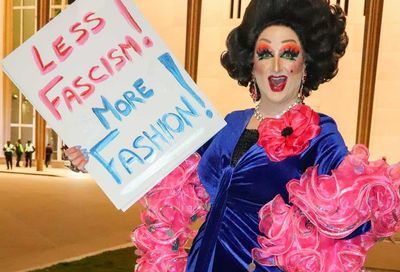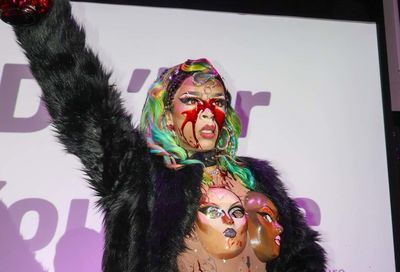On the evening of October 11, 1998, NPR’s Daniel Zwerdling began telling a story on All Things Considered that would become a part of the fabric of the gay experience at the time.
“Matthew Shepard, a 21-year-old student of the University of Wyoming, remains in a coma today,” he said. “Doctors say his condition’s getting worse after being brutally beaten and then left tied to a fence on the outskirts of Laramie. He was tied there for 18 hours.”
The NBC Nightly News broadcast on that somber Sunday evening highlighted the homily of Rev. Roger Schmit, whose church was across the street from the school. He directly addressed the beating, telling his parishioners, “Violence and hatred starts in small ways and grows and grows and grows. The cruelty and hate that was inflicted on Matthew Shepard cries out to each one of us to examine our lives and to do it honestly.
“I challenge you as I challenge myself to look into the corners of our lives, those corners that we don’t look at very often. Look there boldly and see what you recognize. Is there hatred there? Are there violent thoughts? Are there violent, hurtful words? Is there ridicule? Do not minimize hate. Do not minimize bigotry.”
The Washington Post‘s Sunday edition detailed how the campus — on Homecoming weekend — was beginning to address the tragedy. Tom Kenworthy reported from Laramie, Wyoming: “Amid the usual hoopla — the marching bands, politicians’ floats, equestrian units and fraternity boys drinking beer at 9:30 a.m. — hundreds of people donned yellow arm bands and marched in tribute to Shepard and the belief that intolerance has no place in the Equality State.”
Kenworthy quoted activist Susan Childs as saying, “There’s a pall on this city. This is a prime opportunity to do something.”
That day, as vigils were held and fears were faced, was National Coming Out Day.
Moments into Monday, at 12:53 a.m. October 12, 1998, however, Matthew Shepard died, with his family — including his mother, Judy Shepard — at his bedside.
Twelve years later, although the nation has changed dramatically in many ways, National Coming Out Day has a similar pall over it as the nation faces the shameful reality of the ongoing prevalence of LGBT youth suicide.
Many suicides have received the attention of the media in recent weeks, and Dan Savage’s “It Gets Better” effort has focused the attention of the YouTube audience in a way that is powerful and reassuring for those looking for such messages.
The attention was too late for teens like Justin Aaberg, who hanged himself on July 9, 2010, following two years of bullying after coming out as gay at age 13, and the pall remains as more teens complete suicide because of the torment and harassment they receive in their schools, workplaces, churches, communities and even homes.
More specifically, the attention has not yet led to measurable action from lawmakers, who are in recess through the mid-term elections, and the White House has not yet recommended or endorsed any specific plan for federal action.
Valerie Jarrett, a senior advisor to President Barack Obama, spoke movingly at the Human Rights Campaign’s National Dinner on October 9 about ending anti-LGBT bullying — noting that she had met earlier in the evening with Justin Aaberg’s mother, Tammy, and his brother, who were attending the dinner. Jarrett did not, however, mention either piece of legislation that was introduced in the 111th Congress aimed at improving the environment for LGBT teens or those non-gender conforming teens who are perceived to be LGBT.
Likewise, although President Barack Obama previously has expressed support for the principle of safe schools — including at this June’s White House LGBT Pride Month reception — the administration has not specifically endorsed either the Student Non-Discrimination Act or Safe Schools Improvement Act. Neither bill, in fact, appeared in the administration’s March “blueprint” for the reauthorization of the Elementary and Secondary Education Act.
Judy Shepard was at the HRC National Dinner on Saturday night, where she met Tammy Aaberg and was recognized from the stage for her tireless efforts to get action taken in the memory of her son. The Matthew Shepard and James Byrd, Jr. Hate Crimes Prevention Act was signed into law nearly one year ago, after more than a decade of her activism.
In the past twelve years, Judy Shepard has been a pillar of strength to young LGBT people across the nation and a model for action to those seeking LGBT equality. It is perhaps easy to forget, though — 12 years removed — how quickly Judy Shepard moved beyond her pain to think of the other families across the nation.
At 4:30 a.m. October 12, 1998, the Poudre Valley Health System in Fort Collins, Colorado, released the news that Matthew Shepard had died. In that statement, Judy Shepard said, “Go home, give your kids a hug and don’t let a day go by without telling them you love them.”
On this National Coming Out Day, a dozen years later, her words echo and her message remains.
Hers, though, is not the only message from those days that resonates if people — including those in government — look back and listen.
This is a prime opportunity to do something.






















